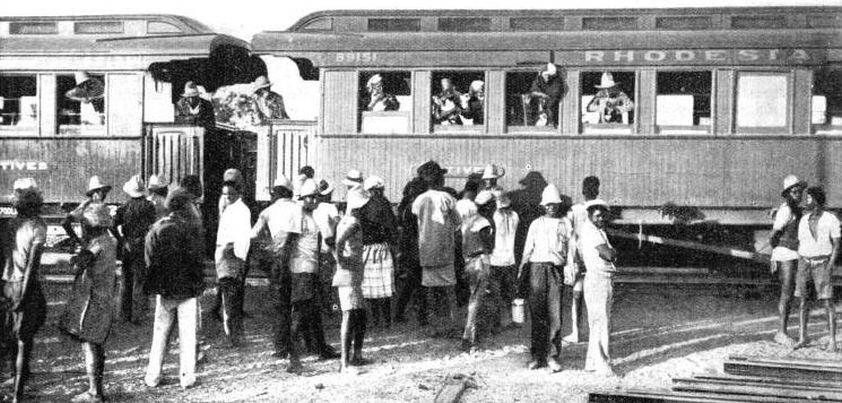 A major theme of this story by Nadine Gordimer, and the reason it is still relevant today, is the need for grass roots involvement in the struggle for justice. A young South African woman whose unionist husband is imprisoned for five years comes to appreciate the need for people at all levels to join hands in resisting oppression. Although the exploitation of poorly educated indigenous laborers depicted in the story has greatly diminished, injustice in many other forms is still rampant throughout the world. Other themes: racism, the right to protest, the importance of learning, love, loneliness, dedication, change. More…
A major theme of this story by Nadine Gordimer, and the reason it is still relevant today, is the need for grass roots involvement in the struggle for justice. A young South African woman whose unionist husband is imprisoned for five years comes to appreciate the need for people at all levels to join hands in resisting oppression. Although the exploitation of poorly educated indigenous laborers depicted in the story has greatly diminished, injustice in many other forms is still rampant throughout the world. Other themes: racism, the right to protest, the importance of learning, love, loneliness, dedication, change. More…
Archives
Six Feet of the Country
 This early apartheid-era story by Nadine Gordimer highlights the white South African bureaucracy’s callousness and cultural insensitivity towards other races. While city-dwelling whites live in fear, the unnamed protagonist and his wife peacefully co-exist with their black farm workers on a small property just out of town. When the visiting brother of one of their workers dies, the authorities take the body away for autopsy. After paying £20 to have it returned for burial, they find a different body in the coffin. Major themes: racism and inequality (even in death!), change. More…
This early apartheid-era story by Nadine Gordimer highlights the white South African bureaucracy’s callousness and cultural insensitivity towards other races. While city-dwelling whites live in fear, the unnamed protagonist and his wife peacefully co-exist with their black farm workers on a small property just out of town. When the visiting brother of one of their workers dies, the authorities take the body away for autopsy. After paying £20 to have it returned for burial, they find a different body in the coffin. Major themes: racism and inequality (even in death!), change. More…
Town and Country Lovers
 Although the South African law banning sexual intercourse between “whites” and “non-whites” was repealed in 1985 (five years after Nadine Gordimer wrote this story), inter-racial and inter-religious relationships are still frowned upon in some cultures. Moreover, as in the story, the consequences for women are often much more severe than for men. Despite the obvious affection between the two couples in the story, questions arise as to whether for the men the sex was a function of convenience rather than love, and the extent to which the women initially felt pressured into participating. Themes: forbidden love, sexual coercion, unequal consequences. More…
Although the South African law banning sexual intercourse between “whites” and “non-whites” was repealed in 1985 (five years after Nadine Gordimer wrote this story), inter-racial and inter-religious relationships are still frowned upon in some cultures. Moreover, as in the story, the consequences for women are often much more severe than for men. Despite the obvious affection between the two couples in the story, questions arise as to whether for the men the sex was a function of convenience rather than love, and the extent to which the women initially felt pressured into participating. Themes: forbidden love, sexual coercion, unequal consequences. More…
A Chip of Glass Ruby
 Some people see this Nadine Gordimer story as primarily an anti-apartheid tale. For me, the main theme is exemplified in Yusuf’s “aha moment” when he finally understands why his wife is not like the others. Gordimer shows apartheid for what it is by contrasting those behind it with an extra-ordinary, ordinary woman who doesn’t want anybody to be left out (people without somewhere to live, hungry kids, boys who can’t get educated) and cares enough to put herself at risk by doing something about it. The absence of a denouement in the story suggests that her fight isn’t yet over. More…
Some people see this Nadine Gordimer story as primarily an anti-apartheid tale. For me, the main theme is exemplified in Yusuf’s “aha moment” when he finally understands why his wife is not like the others. Gordimer shows apartheid for what it is by contrasting those behind it with an extra-ordinary, ordinary woman who doesn’t want anybody to be left out (people without somewhere to live, hungry kids, boys who can’t get educated) and cares enough to put herself at risk by doing something about it. The absence of a denouement in the story suggests that her fight isn’t yet over. More…
The Ultimate Safari
 Set during the Mozambican Civil War, this story from Nadine Gordimer follows a family as they undertake an arduous journey to a South African refugee camp through Kruger Park. The story is told through the eyes of a nine year-old girl who understands little about the war other than that her father is away fighting for the government. Following her mother’s disappearance while buying cooking oil, the rest of her family join a group of other displaced villagers for the dangerous 40-mile (65 km) trek through the park. Themes include family, war, loss, lawlessness, displacement, fear, endurance, hope. More…
Set during the Mozambican Civil War, this story from Nadine Gordimer follows a family as they undertake an arduous journey to a South African refugee camp through Kruger Park. The story is told through the eyes of a nine year-old girl who understands little about the war other than that her father is away fighting for the government. Following her mother’s disappearance while buying cooking oil, the rest of her family join a group of other displaced villagers for the dangerous 40-mile (65 km) trek through the park. Themes include family, war, loss, lawlessness, displacement, fear, endurance, hope. More…
The Bridegroom
 This story by Nadine Gordimer begins with a poetic description of the camaraderie between an Afrikaans overseer and his native African work crew as they enjoy a musical evening around a campfire. The living arrangements in their isolated road-building camp are segregated. However, loneliness has brought the overseer relatively close to the men, who look upon him indulgently. Things are about to change. The overseer is bringing his new wife to live in the camp. He shows his true self by having all the cooking and cleaning done for her, and forbidding the men from going anywhere near their caravan. More…
This story by Nadine Gordimer begins with a poetic description of the camaraderie between an Afrikaans overseer and his native African work crew as they enjoy a musical evening around a campfire. The living arrangements in their isolated road-building camp are segregated. However, loneliness has brought the overseer relatively close to the men, who look upon him indulgently. Things are about to change. The overseer is bringing his new wife to live in the camp. He shows his true self by having all the cooking and cleaning done for her, and forbidding the men from going anywhere near their caravan. More…
The Train from Rhodesia
 In this Nadine Gordimer story, poverty-stricken villagers hawking food and local crafts swarm an African passenger train during its short stop at an isolated station. A young passenger admires a beautifully carved lion offered by a frail old man, but rejects it as being too expensive. She becomes upset when her husband later presents it to her, proudly announcing that he paid less than half the asking price. Although clearly outraged by his pleasure in humiliating the old man, her anger may imply other problems in their relationship. Themes: racial inequality, wealth and poverty, greed, exploitation, shame, identity and independence. More…
In this Nadine Gordimer story, poverty-stricken villagers hawking food and local crafts swarm an African passenger train during its short stop at an isolated station. A young passenger admires a beautifully carved lion offered by a frail old man, but rejects it as being too expensive. She becomes upset when her husband later presents it to her, proudly announcing that he paid less than half the asking price. Although clearly outraged by his pleasure in humiliating the old man, her anger may imply other problems in their relationship. Themes: racial inequality, wealth and poverty, greed, exploitation, shame, identity and independence. More…
Once Upon a Time
 Although Nadine Gordimer’s Once Upon a Time follows a fairy-tale pattern (there is even a wise old witch!), the storyline doesn’t have a fairy-tale ending. On a superficial level, it could be regarded as a parody of The Three Little Pigs: a family builds a stronger and stronger house to keep out the big bad wolf, only for the extra security to ruin their lives. On a more serious note, the story has several important themes: Racism, Apartheid and Inequality (which lead to Social Decay) and the consequences of being ruled by Fear (Anxiety, Overreaction, and in this case Self-Destruction). More…
Although Nadine Gordimer’s Once Upon a Time follows a fairy-tale pattern (there is even a wise old witch!), the storyline doesn’t have a fairy-tale ending. On a superficial level, it could be regarded as a parody of The Three Little Pigs: a family builds a stronger and stronger house to keep out the big bad wolf, only for the extra security to ruin their lives. On a more serious note, the story has several important themes: Racism, Apartheid and Inequality (which lead to Social Decay) and the consequences of being ruled by Fear (Anxiety, Overreaction, and in this case Self-Destruction). More…